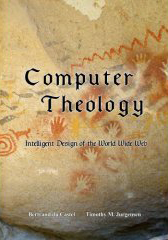PRESS
COMPUTER THEOLOGY |
||||
|
to know and share many secrets: one with each of the other
entities. Actually, all of us could share only one secret, but then I can’t
differentiate the other entities; they all look alike as far as the single
secret allows me to determine. So, one is faced with the problem of sharing
lots of secrets, which entails a big administrative problem to keep them all
straight; or, we share a single secret, which entails the high risk that
someone will let that secret become known to someone outside our desired circle
of trust. If I want to avoid remembering all the
secret keys of all the participants in my circle of trust, what I would like is
simply being able to ask each participant for evidence that they are indeed in
my circle of trust. But isn’t that the same as asking them for their secret
key? Obviously they will not give me their secret key if they don’t know who I
am, will they? So I need to give them my secret key first? Is there a way to
get out of this conundrum? In fact there is one, inspired from how
banknotes are made. When I look at a dollar bill, I notice that it is made of
special paper, with intricate inscriptions, that are difficult to reproduce. It
has a picture of a president, to make sure that I understand that the power of
the state is behind this paper; don’t I dare to question its value. And if I
have not understood yet, there are some religions symbols, including the famous
“In God we trust.” So we see here a typical chain of trust. Similarly, if
anybody in my circle of trust, instead of presenting me with a secret key,
could present me with the equivalent of a dollar bill that could be trusted
because it has the full power of the state and religion behind it, then that
should be enough. However, the state is not going to print dollar bills
especially for my own circle of trust, so is there some equivalent of that I
could use? It turns out there is, and it is based on
some relatively complex arithmetic that we will not expand into here, and you
can skip the remainder of this paragraph is you are mathematically adverse. We
will just say that it is possible for a participant (let’s call him John) in my
chain of trust to publish a number. This number is called John’s public key.
I can use John’s public key, mix it up a little with some data of my own, and
ask John to untangle what I have done. In order to do that, John has to know
another number, this one secret, so it’s called the secret key
corresponding to the public key. With this private key, John can untangle what
I gave him, and therefore I know that he owns the proper secret key. This
method is known as public key
cryptography, sometimes also called asymmetric
key cryptography. Now I don’t need to know nor remember John’s secret key
anymore. I just need to ask him for his public key, and make sure that he has
the corresponding private key by sending him a tangled message. But I you’ve
followed so far, you’re going to ask “Fine, but how is this public key of John
related to my circle of trust?” Well, that’s where it becomes a little more
involved. What we need here is to all agree in our circle of trust on somebody
to be the guarantor of public keys. This person will have a master public key,
and will be the one distributing individual public keys when required. To come
back to our dollar bill analogy, the person having the master public key has
the role of the state in distributing individualized dollar bills to each
participant (that’s the participant’s public key), who can in turn present that
dollar bill to prove that they are part of the circle of trust. But who’s
playing God in this analogy? We’ll come back to that later. The reader has
certainly noticed already that the privileged participant to the circle of
trust looks much like a shaman. Safety and Security Needs
Living organisms seek safety and security within their environments by making use of the physiological capabilities that they possess; their sensori-motor systems and their cognitive |
||||
|
||||
© Midori Press, LLC, 2008. All rights reserved for all countries. (Inquiries) The contents of ComputerTheology: Intelligent Design of the World Wide Web are presented for the sole purpose of on-line reading to allow the reader to determine whether to purchase the book. Reproduction and other derivative works are expressly forbidden without the written consent of Midori Press. Legal deposit with the US Library of Congress 1-33735636, 2007.
|
ComputerTheology Intelligent Design of the World Wide Web Bertrand du Castel and Timothy M. Jurgensen Midori Press, Austin Texas 1st Edition 2008 (468 pp) ISBN 0-9801821-1-5 |
Book available at Midori Press (regular) |
